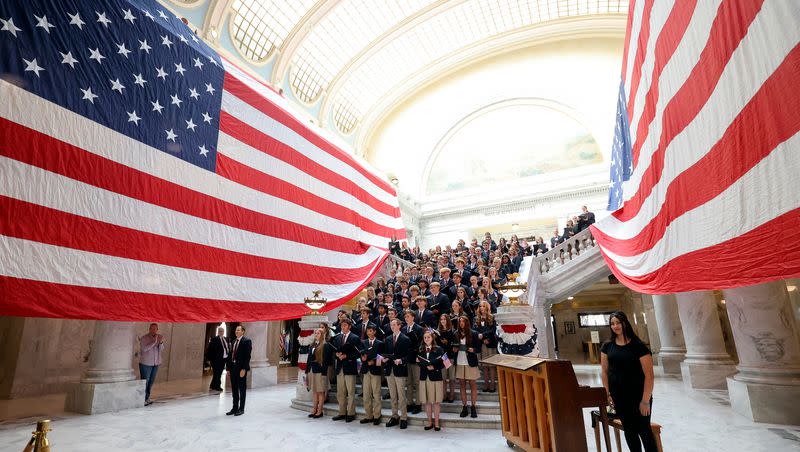Opinion: The virtues of the Constitution expand the meaning of patriotism

- Oops!Something went wrong.Please try again later.
- Oops!Something went wrong.Please try again later.
When the American founders came together in the muggy summer days of Philadelphia in 1787, they represented vastly different geographic areas, political perspectives, religious views and economic outlooks. They sweated out nearly four months behind closed doors and windows because they were committed to the fledgling nation of the United States of America.
That joint endeavor enabled the birth of the U.S. Constitution and the strengthening of our young country. Though imperfect, the Constitution contained the seeds with which to improve itself — such as through amendments in the Bill of Rights, those of Reconstruction, the 19th granting women’s suffrage, and more.
Like the founders, America’s parents and teachers are engaged in a joint endeavor to strengthen our country by supporting our students. They recognize the need to shore up our civics education to include knowledge, skills, dispositions and virtues. These are taught first in the home and second in the schools. This collaboration is vital to the strength of our unity and the robustness of our democratic republic.
Civics education is multifaceted. Its knowledge dimension embodies an understanding of the facts and concepts about our nation’s history and government, including the “miracle at Philadelphia” in 1787. We must also recognize the many missing from early American concepts of “We the People.” Civics-related skills are those required to effectively participate in civic and political life, such as thoughtful speech, listening and collaboration. Dispositions are personal commitments to the ideals important to democracy, such as allegiance to the constitutional rights and freedoms of others, respect for the rule of law, and a recognition of the need for reason and humility.
But it is the quality of civic virtues that lays the foundation for all other components, and these are often first ingrained in the home. According to the National Constitution Center, civic virtues describe “the personal qualities associated with the effective functioning of the civil and political order or the preservation of its values and principles.” Civic virtue includes public spiritedness, charity, civility, courage, integrity, prudence and justice. Most of these virtues have in common, according to Judge Thomas B. Griffith, the “deliberate decision to set aside personal interests and seek the well-being of others and the nation.” Significantly, notes the National Constitution Center, “(T)he Founders designed the American republic with those qualities in mind and believed they were essential to upholding it.”
Related
Moreover, for many in the early colonies and new republic, the American Revolution and efforts to form a constitution were not only a civic but also a family affair — both women and men hoped, worked and sacrificed for independence and then debated what form of government would be necessary to govern We the People. Nowhere is this better exemplified than in the correspondence between the members of the Abigail and John Adams family during the period of the American founding.
In a letter to John dated Nov. 27, 1775, Abigail expressed her apprehension over what type of government would soon arise: a “Monarchy or democracy or what ever is to take place ... (B)ut whatever occurs, may justice and righteousness be the Stability of our times. ... Great difficulties may be surmounted, by patience and perseverance.” Here we see her concern, above all else, for the preservation of civic virtues, including justice and righteousness, patience and perseverance. A few months later, as she continued to contemplate the new government to be established, Abigail reminded John to “Remember the Ladies, and ... (d)o not put such unlimited power into the hands of the Husbands.”
Finally, as Abigail and John’s son John Quincy Adams traveled to France in 1780, his mother encouraged the development of the virtues she saw in her husband. To truth she suggested adding “justice, fortitude, and every Manly Virtue which can adorn a good citizen.” Abigail’s lifelong dedication to civic virtues explains the opening line of her obituary: “This lady was not more elevated by rank, than eminent by her virtues.” By likewise promoting civic virtues, we contribute to this joint endeavor.
As you consider how you will support our democratic republic, be willing to expand your understanding of patriotism and love of country. While many of us demonstrate these things by dressing in red, white and blue, waving the flag, or reciting the pledge of allegiance, the founders’ concern was more about our ability to develop civic virtues and practice self-restraint. Individual self-government, they believed, was foundational for public self-government.
We at the Civic Thought and Leadership Initiative and the Center for Constitutional Studies at Utah Valley University support the joint effort that parents and teachers are making in the civic education of Utah’s students. Next month, we will host our annual civics-educator conference. This year, our audience will not only be teachers; parents will participate as well. We’re calling it “Home Cooking with Schoolhouse Seasoning: Teachers and Parents Partnering on Civics.”
Together, We the People — families, parents, teachers, children — can support one another in this joint endeavor to raise up a new generation with the civics knowledge, skills, dispositions, and particularly virtues needed to sustain our democratic republic.
Lisa R. Halverson is a Civics Education Fellow at Utah Valley University’s Center for Constitutional Studies.

